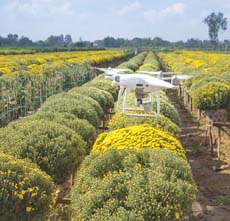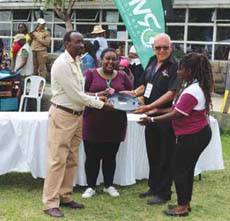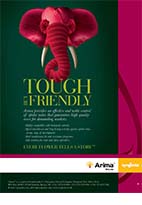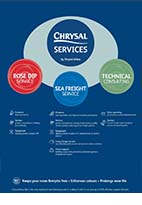Featured Past Articles
By Zablon Oyugi
The Kenya, Netherlands cooperation in agriculture took a dive into Sanitary and Phytosanitary Standards (SPS) concerns raised by farmers and exporters during the recently concluded Naivasha Horticultural Fair in Nakuru County.
The initiative is a continuation of the bilateral cooperation in agriculture between Kenya and Netherlands following a bilateral cooperation in the sector the two parties signed in July this year.
According to Bart Pauwels, Agriculture Counsellor at the Embassy of the Kingdom of the Netherlands who opened the event, the role of SPS in international trade and agri-business has changed over the past decade from the technical sense to being a competitive instrument in differentiated product market hence the need to give it a proper focus.
“SPS measures are now becoming a strategic tool for developing and differentiating markets, gaining market access, coordinating the quality and safety of the food system, and defining market niches for export products.”
In a major victory for science, a French court on 17 October dismissed a defamation lawsuit by the notorious French anti-GMO activist scientist Gilles-Eric Séralini, finding instead in favour of three fact-finding journalists whom Séralini had sued for calling his work “fraudulent.”
 Geraldine Woessner, one of the three journalists targeted by Séralini, announced on X/Twitter: “I am pleased to announce that jurisprudence has FINALLY changed: in the defamation case brought against me by Gilles-Eric Séralini, for having referred to his 2012 study on GMO-fed rats as ‘fraudulent,’ the court has just ruled in my favor. Have a great day!” She added: “My colleagues @MacLesggy and Patrick Cohen, who was also being pursued, have been acquitted.”
Geraldine Woessner, one of the three journalists targeted by Séralini, announced on X/Twitter: “I am pleased to announce that jurisprudence has FINALLY changed: in the defamation case brought against me by Gilles-Eric Séralini, for having referred to his 2012 study on GMO-fed rats as ‘fraudulent,’ the court has just ruled in my favor. Have a great day!” She added: “My colleagues @MacLesggy and Patrick Cohen, who was also being pursued, have been acquitted.”
Fraudulent and misleading
The case dates back to 2019 when Séralini, a French biologist at the University of Caen, sued Mac Lesggy, Patrick Cohen, and Geraldine Woessner for defamation after the three journalists had described the findings of his controversial – and subsequently retracted – study on rats fed on GMO corn and Roundup as fraudulent and misleading. Patrick Cohen, for instance, had referred on French television to Seralini’s controversial paper as “one of the worst scientific deceptions of the past ten years.”
 Precision Agriculture Meets Flower Farming Flower farming, like other agricultural sectors, is experiencing a transformative shift towards data-driven scouting. This approach harnesses the power of technology and data analysis to optimize various aspects of flower cultivation.
Precision Agriculture Meets Flower Farming Flower farming, like other agricultural sectors, is experiencing a transformative shift towards data-driven scouting. This approach harnesses the power of technology and data analysis to optimize various aspects of flower cultivation.
Remote Sensing and Imaging: A Bird’s Eye View
Key to data-driven scouting in flower farming is the use of advanced technologies, including drones and satellites, which provide high-resolution images of flower fields. This real-time imagery enables farmers to closely monitor crop health, detect diseases, and assess overall plant condition. The result? Timelier, more accurate decisions in the field.
Pest and Disease Management: Targeted Solutions
Effective pest and disease management is paramount in flower farming. Data-driven scouting empowers farmers to collect data on the presence and severity of these threats. Armed with this information, they can implement precise, targeted interventions, reducing the need for broad-spectrum chemical treatments and minimizing the environmental impact.
Read more: Unlocking the Future of Flower Farming: The Data-Driven Revolution
 Horticultural production is concentrated in regions such as the Great Rift Valley, Lake Naivasha, Mount Kenya, and Nairobi. The total horticultural area spans approximately 496,062 hectares, yielding 7.9 million metric tonnes, with roses dominating flower exports. For more than two decades, the Naivasha Horticultural Fair has been a hub of innovation, knowledge-sharing, and business networking for those involved in the cultivation of plants, herbs, flowers, fruits, and vegetables. This annual fair has grown from modest beginnings to a grand spectacle, drawing participants from across the globe to showcase their products, exchange ideas, and explore the latest advancements in the field of horticulture.
Horticultural production is concentrated in regions such as the Great Rift Valley, Lake Naivasha, Mount Kenya, and Nairobi. The total horticultural area spans approximately 496,062 hectares, yielding 7.9 million metric tonnes, with roses dominating flower exports. For more than two decades, the Naivasha Horticultural Fair has been a hub of innovation, knowledge-sharing, and business networking for those involved in the cultivation of plants, herbs, flowers, fruits, and vegetables. This annual fair has grown from modest beginnings to a grand spectacle, drawing participants from across the globe to showcase their products, exchange ideas, and explore the latest advancements in the field of horticulture.
Read more: Naivasha Horticultural Fair 2023: Thriving Two Decades Later!
 is a special year for Danziger, celebrating 70 years as a company alongside the celebration of the founder, Ernest Danziger’s 100-year birthday on November 16th.
is a special year for Danziger, celebrating 70 years as a company alongside the celebration of the founder, Ernest Danziger’s 100-year birthday on November 16th.
With enthusiasm for flowers, appreciation for beauty, and everything in between, Ernest and Zehava Danziger founded their company in the early 1950s. At that time, they could not have imagined that in 2023 Danziger would produce and sell more than 750 million plants and cuttings worldwide, adding color and happiness to many places in the world.
In the fast-paced world of business and innovation, few individuals leave a mark as indelible as Ernest Danziger has on the floriculture industry. As we reflect on a century of a life well lived, we celebrate a hard-working and creative leader who is blessed with unwavering optimism. Together with his wife, Zahava Danziger, they have built an enduring legacy with their own hands.
Read more: Danziger’s founder, Ernest Danziger, Celebrates his 100 birthday!
 Marketing flowers to Millennials can be challenging, particularly since they perceive them as traditional and more of a luxury purchase. However, Millennials are the largest generation in the United States, with plenty of spending power. So, how can you increase their interest in buying flowers? Here are eight ways to appeal to their values and lifestyle with your floral marketing.
Marketing flowers to Millennials can be challenging, particularly since they perceive them as traditional and more of a luxury purchase. However, Millennials are the largest generation in the United States, with plenty of spending power. So, how can you increase their interest in buying flowers? Here are eight ways to appeal to their values and lifestyle with your floral marketing.
Share Your Knowledge with Online Content
Because flowers are perceived to be expensive to this group, it’s vital to show the added value of flowers. Create a blog where you provide information about how to care for flowers, tips to make floral arrangements last longer, the meaning behind each flower, DIY guides, and socially conscious information (sustainable products, reduced chemical usage, etc.). This extra knowledge will add perceived value to your flowers and boost customer loyalty. Publishing content regularly is also a great way to move up the search engine rankings!
By Mary Mwende Mbithi

 In the not-so-distant past, packaging was a laborious task, with boxes that were a hassle to assemble and far from eco-friendly. Reusability seemed like a distant dream. However, times have changed, and so has the world of packaging. The Hybrid Flower Box, a groundbreaking innovation from Allpack Industries, is definitely where innovation meets sustainability, and where your business meets success and it’s set to transform the way we think about packaging.
In the not-so-distant past, packaging was a laborious task, with boxes that were a hassle to assemble and far from eco-friendly. Reusability seemed like a distant dream. However, times have changed, and so has the world of packaging. The Hybrid Flower Box, a groundbreaking innovation from Allpack Industries, is definitely where innovation meets sustainability, and where your business meets success and it’s set to transform the way we think about packaging.
It is nothing short of a game-changer and not only is it fully recyclable, leaving a significantly smaller carbon footprint, but it also boasts a remarkable up to 4% reduction in the cost per box. And the savings don’t end there. Thanks to its reduced weight, that accounts for a significant decrease in freight costs.
Read more: Revolutionizing Packaging: Allpack’s Hybrid Flower Box


